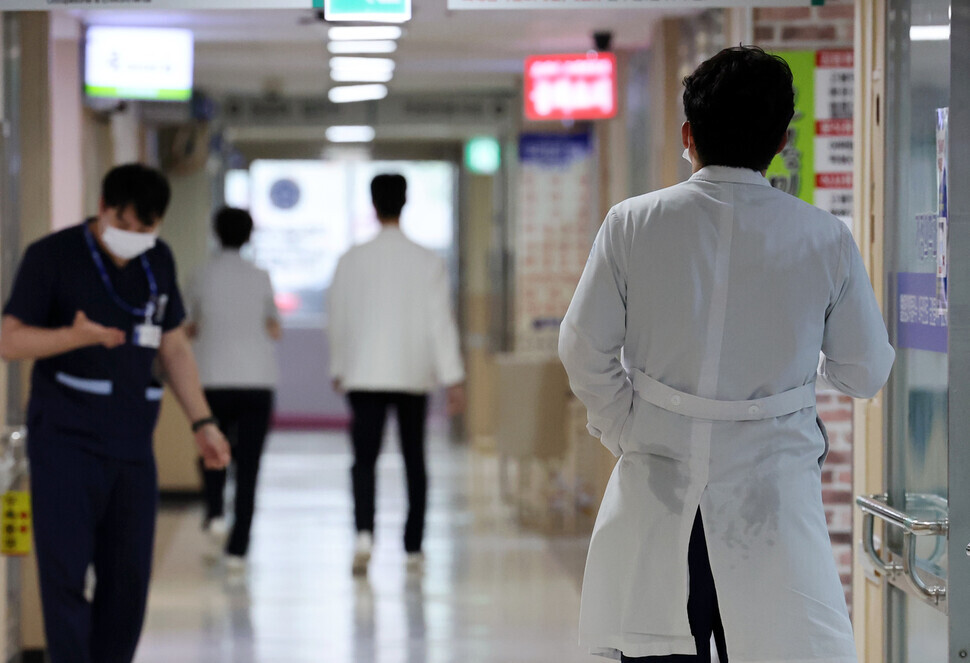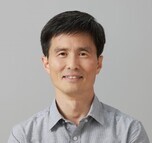hankyoreh
Links to other country sites 다른 나라 사이트 링크
[Column] Why we may not want to celebrate the crackdown on Korea’s striking doctors


By Lee Chun-jae, editorial writer
I couldn’t help but crack a wry smile when an acquaintance complained about how their son, a medical resident at a university hospital and once-avid Yoon Suk-yeol supporter, has since turned his back on the president.
While he had approved wholeheartedly of the government’s crackdown on striking truckers, he was likely taken aback when he and his colleagues became the next target.
Most medical residents and interns probably feel the same, but what can they do? The public is demonstrating completely different sympathies.
Yoon’s approval ratings, which had been stuck in the 30% range, are now fast approaching the 40% range, all thanks to the doctors’ collective action. According to a survey conducted by Gallup Korea from Feb. 27 to Feb. 29, 39% of 1,001 voting-age Koreans responded by saying that they approved of Yoon’s job as president.
At 21%, the plurality of those who approved of Yoon cited the government policy on increasing medical school enrollment quotas as the primary reason for their satisfaction.
This shows how the public is responding to Yoon’s firm stance against doctors opposing the admissions increase, with Yoon’s “decisiveness, drive and determination” being the third most popular reason signifying the public’s approval.
It has been almost eight months since Yoon’s approval ratings last approached the 40% barrier, the last time being in the first week of July 2023, at 38%. This is the highest level of rebound in his approval ratings since the beginning of his presidency, when he enjoyed approval in the 50% range.
As such, it seems that Yoon is finally managing to take a break from worrying about his biggest Achilles’ heel: the first lady’s luxury handbag scandal. The Yoon we’re seeing on news broadcasts is brimming with confidence.
At a Kyungpook National University roundtable on livelihood issues on Monday, the university’s president requested that the expansion of the medical school quota lead to medical schools being provided with top-tier facilities in order to train hard-working doctors. To that request, Yoon replied airily, “Don’t you worry. We’ll provide only the best support.”
The president’s confidence has created a trickle-down effect. Prime Minister Han Duck-soo stated, “If the illegal vacating of medical sites continues, the government will have no choice but to follow its constitutional and legal duties,” while Interior Minister Lee Sang-min has warned that medical residents and interns who do not return to their posts by March 3 “will be punished severely in accordance with the law.”
The police barred high-ranking officials in the Korean Medical Association from leaving the country and raided their offices. As can be expected from an administration led by a former prosecutor, it is trying to catch many birds with one stone — that stone being the law.
However, we know only too well how strict adherence to the law can lead politics to crumble, with the last administration’s investigative purges being prime examples.
The Moon Jae-in administration was eager to launch investigations into corruption by the Lee Myung-bak and Park Geun-hye administrations, and left the investigations to Yoon Suk-yeol, who was prosecutor general at the time.
Those embroiled in government influence-peddling, judicial abuse, and suppressing artists and writers through a “cultural blacklist” were all summoned to the prosecution and subjected to questioning.
Most high-ranking officials responsible for the scandals were punished. Seeing those who were summoned to the prosecutor’s office trudge to jail after being issued with arrest warrants made us feel that a complete “corruption clean-up” had taken place.
The public was also happy with the proceedings. In a January 2018 survey conducted by Gallup Korea on behalf of JTBC, only 22.5% of South Koreans viewed the investigations into Park Geun-hye and Lee Myung-bak as “political revenge,” with 67.4% saying that they were much-needed “investigations into corruption.”
Moon Jae-in administration supporters started to perceive prosecutors, led by Yoon, as those who were best able to fulfill an important national task: ridding the country of corruption.
However, investigations into key figures of the former administrations have been met with strong opposition.
The ruling and opposition parties do not view each other as competitors, but as enemies who should be eliminated from South Korean politics. Any semblance of dialogue and compromise has disappeared.
Since the National Assembly is in a state of constant gridlock, issues that require urgent attention, such as real estate, education, the disparity between the rich and the poor, and chaebol reform, have not even been touched upon.
Even the major reshuffling of personnel, which was made possible through prosecutors’ investigations, has been made useless when the former-prosecutor-turned-president, pardoned every problematic individual after coming into power.
Investigative purges have now been rendered absolutely useless.
Who benefited the most from such purges? The prosecution service. The prosecutor general hit the jackpot and became the South Korean president, his right-hand man is the interim leader of the ruling party, and those who participated in the investigations landed key positions and roles in the government.
Prosecutors have become vital resources to the Yoon administration. They’re doing what they do best to plow ahead with raising the cap on medical school admissions.
“The government will never defeat doctors.” Such extreme rhetoric from some physicians is good fuel for fire. Members of the public who are tired of corruption rife in the medical field, will cheer with joy at the news of more investigations by the prosecution service.
Seeing Korean Medical Association officials be summoned, arrested, and put on trial will give off the illusion that corruption has been dealt with, once and for all.
Prosecutors will be given even more power. Doesn’t this scene seem too familiar?
We cannot let ourselves be fooled once again by the prosecutor-led investigations. When it comes to dealing with the physicians’ collective action, we need the government to engage in politics, rather than in unyielding retaliation.
We need a much-awaited health care overhaul; an overhaul that can ensure that patients in need of urgent care can be ushered to an emergency room as soon as possible, that worried patients no longer have to visit pediatricians at the crack of dawn, and which prevents the falling apart of health care facilities in rural areas.
In order to achieve that goal, the government should remember that they should be engaging in discussion and concessions.
Please direct questions or comments to [english@hani.co.kr]

Editorial・opinion
![[Column] Season 2 of special prosecutor probe may be coming to Korea soon [Column] Season 2 of special prosecutor probe may be coming to Korea soon](https://flexible.img.hani.co.kr/flexible/normal/500/300/imgdb/original/2024/0426/3317141030699447.jpg) [Column] Season 2 of special prosecutor probe may be coming to Korea soon
[Column] Season 2 of special prosecutor probe may be coming to Korea soon![[Column] Park Geun-hye déjà vu in Yoon Suk-yeol [Column] Park Geun-hye déjà vu in Yoon Suk-yeol](https://flexible.img.hani.co.kr/flexible/normal/500/300/imgdb/original/2024/0424/651713945113788.jpg) [Column] Park Geun-hye déjà vu in Yoon Suk-yeol
[Column] Park Geun-hye déjà vu in Yoon Suk-yeol- [Editorial] New weight of N. Korea’s nuclear threats makes dialogue all the more urgent
- [Guest essay] The real reason Korea’s new right wants to dub Rhee a founding father
- [Column] ‘Choson’: Is it time we start referring to N. Korea in its own terms?
- [Editorial] Japan’s rewriting of history with Korea has gone too far
- [Column] The president’s questionable capacity for dialogue
- [Column] Are chaebol firms just pizza pies for families to divvy up as they please?
- [Column] Has Korea, too, crossed the Rubicon on China?
- [Correspondent’s column] In Japan’s alliance with US, echoes of its past alliances with UK
Most viewed articles
- 1AI is catching up with humans at a ‘shocking’ rate
- 2After election rout, Yoon’s left with 3 choices for dealing with the opposition
- 3Is Japan about to snatch control of Line messenger from Korea’s Naver?
- 4South Korea officially an aged society just 17 years after becoming aging society
- 51 in 5 unwed Korean women want child-free life, study shows
- 6[Column] ‘Choson’: Is it time we start referring to N. Korea in its own terms?
- 7Korea’s 1.3% growth in Q1 signals ‘textbook’ return to growth, says government
- 8No good, very bad game for Korea puts it out of Olympics for first time since 1988
- 9[Editorial] Japan’s rewriting of history with Korea has gone too far
- 10Why Korea shouldn’t welcome Japan’s newly beefed up defense cooperation with US